|
|
|
Sort Order |
|
|
|
Items / Page
|
|
|
|
|
|
|
| Srl | Item |
| 1 |
ID:
154637
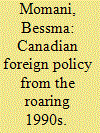

|
|
|
|
|
| Summary/Abstract |
As a field of study, Canadian Foreign Policy has undergone dramatic changes over the last three decades, becoming disconnected from debates about our identity and values and more focused on Canadian foreign and defence policy. This transition in Canadian Foreign Policy reflects the changing priorities of successive Canadian governments and structural shifts in Canadian academia. Yet, such change has unfolded gradually and incrementally, such that key challenges remain for scholars interested in working, presenting, and publishing in Canadian Foreign Policy. Using my own experiences as a student and teacher of foreign policy in Canada, I reflect on these transformations within Canadian Foreign Policy and their implications, beginning with the “golden age” of Canadian Foreign Policy during the 1990s to its decline under the Harper government and, finally, to our current climate of fragmented academic and professional research. In the current climate, participating in traditional and “new” social media places professional incentives (namely, tenure and promotion via peer-reviewed outlets) in tension with emerging opportunities to engage in more open critical analysis of Canadian Foreign Policy.
|
|
|
|
|
|
|
|
|
|
|
|
|
|
|
|
| 2 |
ID:
193261
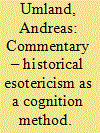

|
|
|
|
|
| Summary/Abstract |
A number of para-academic tendencies in Russian social science helped prepare the Ukraine war. In addition to propaganda and disinformation campaigns by the Kremlin, an intellectual deformation of the Russian elite by the Manichean ideas of such theorists as Lev Gumilyov and Aleksandr Dugin is partly responsible for Russia's increasing secession from Europe. Post-Soviet public discourse has become infected with an array of speculative, often conspiratorial, and sometimes occultist or racist theories. Their proponents have crowded out acknowledged social scientists and historians from intellectual and media debates. This parallel public discourse has been developing since the beginning of glasnost, 35 years ago, and became one of the determinants of Russia's attack on Ukraine in 2014.
|
|
|
|
|
|
|
|
|
|
|
|
|
|
|
|
| 3 |
ID:
174037
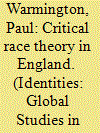

|
|
|
|
|
| Summary/Abstract |
This paper examines the development of Critical Race Theory (CRT) in England, in terms of impact and opposition. Since the early 2000s CRT has become a significant intellectual space for race-conscious scholars and activists in England. The current paper traces the growth of CRT in the field of education (where it has had the greatest impact since its arrival). It identifies the academic research, writing, networks and events that have established CRT in England. It discusses the substantive concerns of English CRT and how these are both similar to and distinct from CRT as developed in the USA. In England, CRT has also met with opposition. This paper examines the discourses of derision voiced by its antagonists, arguing that much of this antagonism has an atavistic quality, being rooted in long-standing antipathy towards race-conscious social analyses.
|
|
|
|
|
|
|
|
|
|
|
|
|
|
|
|
| 4 |
ID:
171320
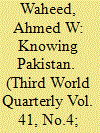

|
|
|
|
|
| Summary/Abstract |
This article explores the processes that contribute towards the image of Pakistan as portrayed to the West. It does this by critically analysing the discursive practices through which knowledge, and a general idea of Pakistan, are created, for example in South Asian area studies journals and South Asian studies centres in Western universities. This article demonstrates that most scholarly research on Pakistan, as published in South Asian studies journals, is in fact heavily influenced by the research of American and European scholars. It argues that as the positionality of these Western scholars is further based on ‘academic quality’, this causes a continuous circle of knowledge production. In this circle, the Western academic produces ‘quality’ work in top area studies journals. Their work then receives wider circulation due to the scholar’s positionality and status within elite, Western centres of knowledge production, whereas research in South Asian studies centres is predominantly India-centric. While true to their proposed research ambit, research conducted on India in South Asian studies centres is multidisciplinary in nature. In Pakistan’s case, most of the research, however marginal, remains centred on the country’s security and its international affairs.
|
|
|
|
|
|
|
|
|
|
|
|
|
|
|
|
| 5 |
ID:
146603
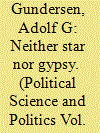

|
|
|
| 6 |
ID:
153314
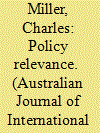

|
|
|
|
|
| Summary/Abstract |
The academic international relations community has come under fire, both in Australia and overseas, for its supposed irrelevance to real-world issues. Recommendations have been made for ‘bridging’ this ‘gap’ between the scholarly and policy worlds. This article takes a sceptical look at some of these recommendations. While this article argues that international affairs academics should be judged on their ability to provide value to society, it also notes that the best way to do so is to capitalise on the academy’s comparative advantages in order to produce high-quality inputs to the public debate. This article expresses concern that some of the recommendations put forward to bridge the gap may, by compromising impartiality, excessively curtailing the time frames for good research, and neglecting theoretical and methodological rigour, run the risk of reducing academia’s value to society.
|
|
|
|
|
|
|
|
|
|
|
|
|
|
|
|
| 7 |
ID:
137516
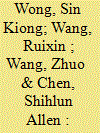

|
|
|
|
|
| Summary/Abstract |
In Singapore, intellectuals, especially those in media and education, are considered as the driving force of formatting public opinion over the social imagination of China and Chineseness. This article, largely based on oral histories of some Singaporean scholars and media professionals and memoirs of related figures, analyzes the choice and acquisition of their knowledge on China. Through the analysis and comparison of their construction of knowledge on China, this article also discusses the accuracy of their understanding of China and how such understandings were formed along with their personal experiences from domestic socialization, education, and professional accumulation. The authors consequently map out the process of how public intellectuals from mass media and academia transform their knowledge imagination of China into the professional opinions that help to reconstruct and shift Singaporean’s impression and understandings of China.
|
|
|
|
|
|
|
|
|
|
|
|
|
|
|
|
| 8 |
ID:
160018
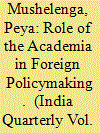

|
|
|
|
|
| Summary/Abstract |
Academics for international relations (IR) studies as an academic discipline have over the years contributed to the process of foreign policymaking. Their contribution has been made through research and publications and providing advisory services to policymakers. Other platforms existing for academics are platforms for debates on foreign policy and providing training to foreign policymakers.
|
|
|
|
|
|
|
|
|
|
|
|
|
|
|
|
| 9 |
ID:
156527
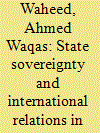

|
|
|
|
|
| Summary/Abstract |
In Pakistan, the field of international relations (IR) theory remains firmly embedded in the ‘realist’ tradition, to the detriment of a wider range of considerations. This stranglehold, strengthened by the particular evolutionary trajectory of the Pakistani state as well as a complacent academia, seems to have created a vicious circle of knowledge reproduction, reinforced by various bids for power, or proximity to it. This article scrutinises specifically the dominant understandings in Pakistan of state sovereignty and security in a broadly historical perspective, showing how the rise of the military, combined with security paranoia, has prevented academic creativity in this field, including scrutiny of recent concerns over rather close China–Pakistan links.
|
|
|
|
|
|
|
|
|
|
|
|
|
|
|
|
| 10 |
ID:
188090
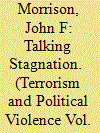

|
|
|
|
|
| Summary/Abstract |
In 2014, Marc Sageman proposed that terrorism research had stagnated. The claim of stagnation has resulted in a period of collective review within terrorism studies. To date, the fruits of this review have revealed a more cautiously optimistic view of the field than that proposed by Sageman. This article aims to add to this review by analyzing the interviews of forty-three guests from the first season of the Talking Terror podcast. Presented is a thematic analysis of their views on the overall health of terrorism research. The interviewees included both pre-and post-9/11 researchers. Through this analysis four themes are identified: Interdisciplinary Research and Researchers, Data, Applied Research, and Area/Field. The majority of interviewees were more optimistic than Sageman in relation to the overall health of the area. Analysis of their responses is presented alongside some recommendations for the future direction of the area.
|
|
|
|
|
|
|
|
|
|
|
|
|
|
|
|
| 11 |
ID:
126709
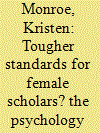

|
|
|
|
|
| Publication |
2013.
|
| Summary/Abstract |
Other articles in this symposium suggest gender bias influences both the acceptance and citation patterns of scholarly articles. This article offers several reasons why such bias exists and proposes several solutions to remedy the problem.
|
|
|
|
|
|
|
|
|
|
|
|
|
|
|
|
|
|
|
|
|